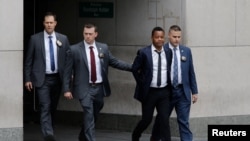Two women who have accused Cuba Gooding Jr. of sexual misconduct will be allowed to testify at his trial on charges that he groped three other women at Manhattan bars in 2018 and 2019, a judge ruled Wednesday.
An April 21 trial date was set for Gooding, who previously pleaded not guilty to an updated indictment that covers the three accusations of groping.
Prosecutors said they had 19 other women who could testify that the Oscar-winning “Jerry Maguire” actor was also inappropriate with them in similar settings, bars, hotels and restaurants, as far back as 2001.
Gooding has denied the charges. His defense attorney, Mark Heller, previously called the allegations “incredulous “and assailed the prosecution as a waste of taxpayer dollars.
Gooding and his attorneys left Wednesday's proceeding without commenting.
The brief hearing at Manhattan criminal court came as opening statements began in the same building in the prosecution of Harvey Weinstein, a landmark moment for the (hash) MeToo movement.
Heller has called the charges against Gooding a “distorted overreaction pandering to the current hypersensitive climate where innocent commonplace gestures are now misperceived and mischaracterized as offensive.” He has accused prosecutors of amplifying long-ago allegations to bolster an otherwise weak case.
Attorneys in the case are expected to return to court next week for a hearing on a protective order governing discovery.
Prosecutors wanted an earlier trial date, but Gooding's defense team said it needed more time to examine the evidence.
Prosecutors asked Judge Curtis Farber to allow a parade of witnesses to testify that Gooding violated them in bars, hotels and restaurants as long ago as 2001. None of those claims resulted in criminal charges, but state law allows prosecutors to call accusers not involved in the criminal case as witnesses in an effort to show a pattern of misconduct.
Gooding prosecutor Jenna Long said in a court filing that the previous incidents make clear that Gooding's “contacts with (women's) intimate parts are intentional, not accidental, and that he is not mistaken about their lack of consent.”
Farber, in a written ruling, said “the admission of all 19 uncharged prior incidents would result in undue prejudice.” He added that admitting a “limited selection of incidents outweighs such prejudice.”
Farber also denied a defense motion to dismiss the charges on the grounds that Gooding was not allowed to testify to the grand jury. The judge wrote that prosecutors “had no obligation to inform the defendant that a grand jury proceeding
April Trial Set for Cuba Gooding Jr. in Bar Groping Case




